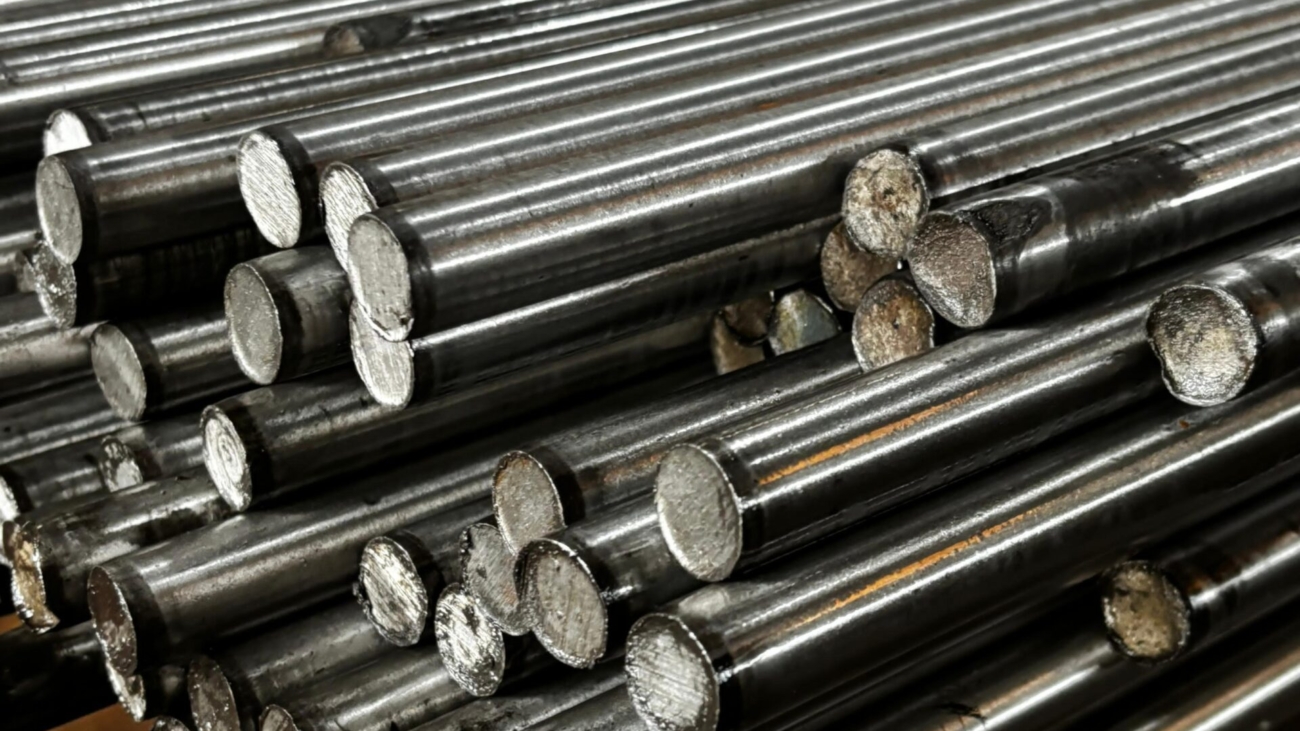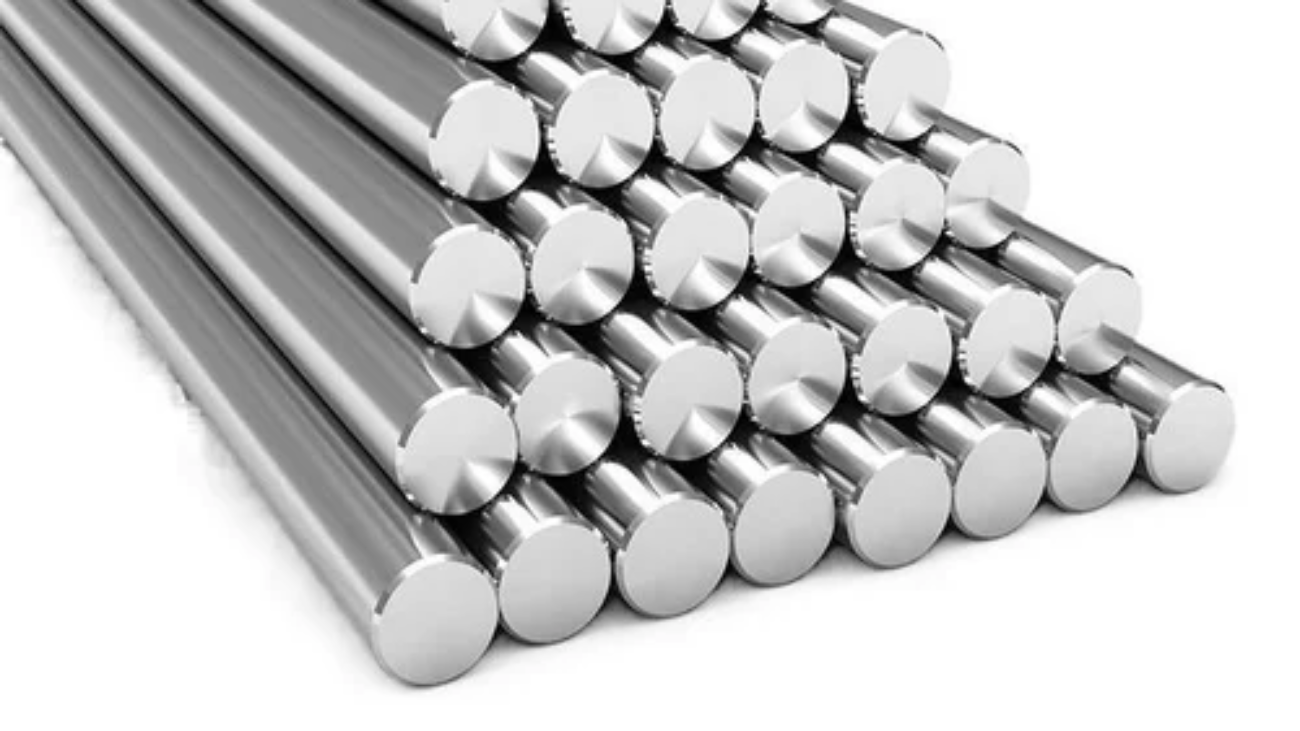Alloy steels are steels that include additional alloying elements beyond just iron and carbon, such as chromium, nickel, molybdenum, manganese, or vanadium. These alloying elements are added in controlled amounts (from a few percent up to 8% or more) to enhance the steel’s overall properties . For example, adding chromium and nickel improves strength and corrosion resistance, while molybdenum and vanadium increase hardenability and wear resistance. In fact, one definition of alloy steel is steel “made by mixing iron, carbon, and other elements like chromium, nickel, and vanadium” to improve strength and durability .
Alloy steel bars come in many grades and forms – round, square, hexagon, flat – and are used where toughness, strength and wear performance are critical. Typical alloy steel grades include EN24 (Ni-Cr-Mo steel), 4130/4140 (Cr-Mo steel), and chrome-manganese steels like 42CrMo4. These bars are often case-hardened or quenched-and-tempered to reach very high hardness in the surface while retaining ductility in the core. Because of their robustness, alloy steel bars are widely used in automotive components (gears, shafts, axles), heavy machinery parts, construction equipment, and high-pressure systems.
Key Benefits of Alloy Steel Bars:
- Enhanced Mechanical Properties: Alloy elements significantly increase tensile strength, toughness and fatigue life compared to plain carbon steel .
- Corrosion and Heat Resistance: Certain alloy steels resist oxidation and softening at high temperatures, making them suitable for engine and high-heat applications.
- Wear Resistance: Alloy steels with elements like chromium or vanadium resist abrasion and can be heat-treated to retain hardness, ideal for tools and dies.
- Wide Grade Selection: From low-alloy steels (like 4130) to high-alloy steels (like stainless or tool steels), there are alloy steel bars for nearly every application.
At Bright Industries, we supply a broad range of alloy steel bars tailored to Indian industry needs. Our portfolio includes round bars, square bars, flats and hex bars in popular alloy grades. For Central Indian customers, we ensure prompt deliveries from Nagpur to Indore, Bhopal or beyond. We use only high-quality alloy steel ingots and apply strict quality checks – for example, we source steels from reputable mills and verify chemical composition to meet specifications. In fact, Bright Industries follows ISO processes to maintain material quality and traceability .
Our team can also guide you on selecting the right alloy steel. For instance, if you need excellent toughness and machinability, we might recommend a nickel-chromium-molybdenum alloy; if you need high surface hardness, a chromium or manganese-alloy steel is better . We stock common lengths but also offer cutting or heat-treatment services as needed. Because our inventory is large and diverse , we can meet both small and bulk orders. Contact Bright Industries to get high-quality alloy steel bars that help your products last longer and perform better.
Tool Steels: Tough Alloys for Industrial Tooling
Alloy steel bars are an essential material in modern manufacturing due to their superior strength, durability, and versatility. Alloy steels are distinguished from plain carbon steels by the addition of other elements like chromium, nickel, molybdenum, manganese, and vanadium. These elements are incorporated in precise amounts—ranging from small percentages up to 8% or more—to impart specific mechanical and chemical properties to the steel. For example, adding chromium and nickel can significantly boost the material’s strength and corrosion resistance, while molybdenum and vanadium enhance its hardenability and resistance to wear. Essentially, alloy steel is made by blending iron and carbon with select alloying elements to create a stronger, more durable material suitable for demanding environments.
These steel bars come in various shapes and sizes, including round, square, hexagonal, and flat forms. They are commonly used in industries that require components capable of withstanding high stress and wear. Popular grades include EN24, a nickel-chromium-molybdenum steel known for its toughness; 4130 and 4140, which are chromium-molybdenum steels; and 42CrMo4, a chromium-manganese alloy with excellent wear properties. Most of these bars undergo additional heat treatments like quenching and tempering or case hardening to enhance their performance further. The hardened exterior provides resistance to wear, while the softer core retains enough ductility to absorb impacts. This makes alloy steel bars ideal for critical applications in sectors such as automotive manufacturing (gears, shafts, axles), heavy industrial machinery, construction equipment, and systems operating under high pressure or temperature.
Applications of Tool Steel:
- Cutting and Forming Tools: End mills, drill bits, saw blades (high-speed steels resist hot tool wear).
- Hot-Work and Cold-Work Dies: Metal forging dies, extrusion dies, stamping dies (tool steels retain strength under heat or impact).
- Mold Making: Injection molds for plastics and die-casting molds (require dimensional stability and polishability).
- Hand Tools: Heavy-duty chisels, hammers, punches (benefit from high hardness and shock resistance).
One of the primary advantages of alloy steel bars is their significantly enhanced mechanical properties. The tensile strength, toughness, and fatigue life of these bars far exceed those of plain carbon steel. These attributes make them ideal for components that must endure high mechanical stress, repeated loading, and exposure to harsh environments. In addition to their mechanical robustness, certain alloy steels are also resistant to corrosion and high temperatures. This is particularly useful in applications like engine components, turbines, or pipelines, where materials must withstand oxidation and maintain structural integrity at elevated temperatures.
Wear resistance is another key benefit, especially when alloying elements like chromium or vanadium are present. These elements increase the hardness of the steel and make it more resistant to abrasion, making alloy steels a preferred choice for manufacturing tools, dies, and industrial equipment subjected to continuous friction or impact. Furthermore, the ability to heat treat alloy steel bars to achieve the desired hardness or tensile properties makes them adaptable to a wide range of uses.
Alloy steel bars are available in an extensive range of grades and compositions. Low-alloy steels like 4130 are favored for their excellent machinability and good balance of strength and toughness. High-alloy steels, including certain tool steels and stainless variants, offer exceptional corrosion resistance and are suitable for specialized applications. The broad availability of grades ensures that engineers and designers can find a material that fits the exact requirements of their project, whether it involves structural supports, machine components, or performance-critical automotive parts.
At Bright Industries, based in Nagpur, we specialize in the manufacturing and distribution of high-quality alloy steel bars tailored to the specific needs of Indian industries. Our product range includes round, square, flat, and hexagonal bars available in a variety of popular alloy grades. We maintain a large and diversified inventory, enabling us to meet orders of all sizes—whether small-batch requests or bulk quantities. Thanks to our strategic location in Central India, we ensure fast and reliable deliveries to cities like Indore, Bhopal, Raipur, and other industrial hubs across the region and beyond.
Our manufacturing process begins with the use of high-quality alloy steel ingots sourced from trusted mills. We conduct rigorous quality checks at every stage to ensure our products meet strict specifications. Each batch is tested for its chemical composition and mechanical properties, ensuring it aligns with industry standards and client expectations. Bright Industries operates under ISO-certified processes, which helps us maintain quality control and material traceability throughout production and supply.
Beyond supplying standard bars, our team offers technical support to help clients choose the most suitable alloy steel for their application. If you’re looking for steel with excellent toughness and good machinability, we may suggest a nickel-chromium-molybdenum alloy like EN24. For projects requiring high surface hardness and wear resistance, chromium- or manganese-based alloys may be more appropriate. We also offer value-added services such as bar cutting to custom lengths and heat treatments like annealing, normalizing, or tempering to meet specific performance requirements.
What sets Bright Industries apart is our commitment to customer satisfaction and our ability to deliver tailored solutions. Our knowledgeable staff understands the challenges of various industries and provides recommendations that optimize both performance and cost-efficiency. Whether you’re a small fabricator or a large-scale OEM, our products are engineered to support your goals with consistent quality, durability, and timely supply.
In summary, alloy steel bars represent a versatile and high-performance solution for manufacturing applications that demand strength, reliability, and adaptability. Their superior mechanical and thermal properties, combined with excellent wear resistance and machinability, make them an indispensable material across industries. Bright Industries continues to support these industries by offering top-grade alloy steel bars that meet the evolving demands of Indian manufacturing.
For more information or to request a quote, contact Bright Industries. Let us help you find the perfect alloy steel solution for your next project—whether you need standard grades or customized specifications, we have the expertise, inventory, and service to deliver precisely what you need.


